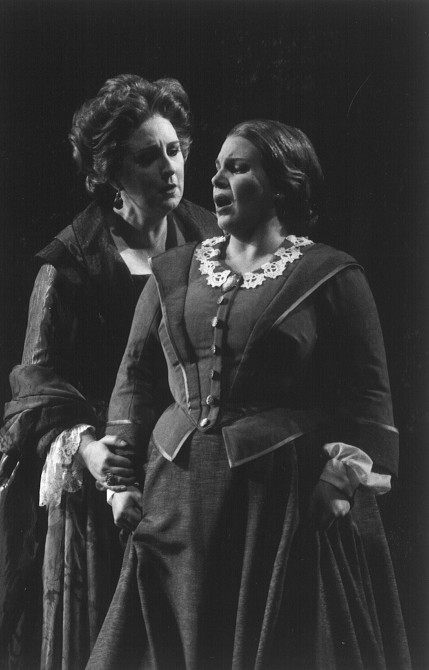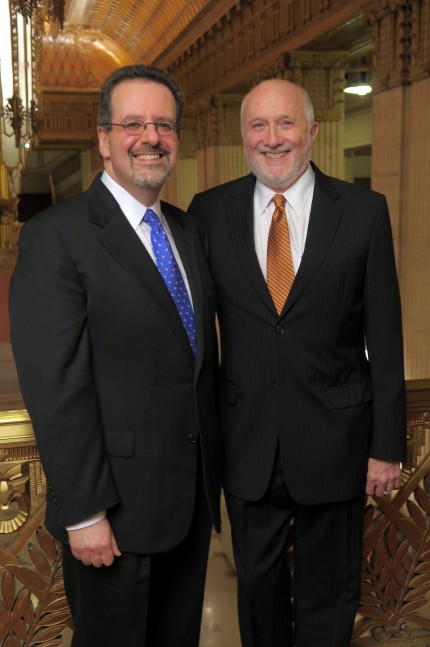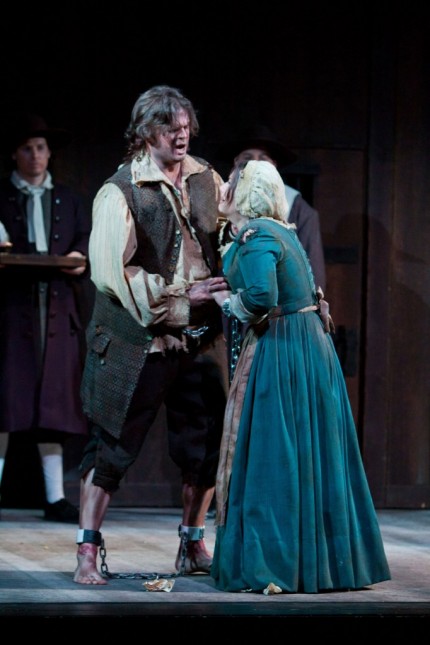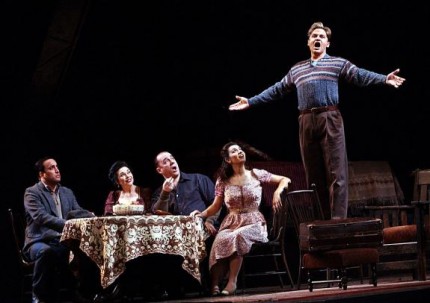W(h)ither American opera?
The Lyric Opera’s move into Broadway musicals — and away from American opera — raises questions of artistic vision

Lauren Flanigan (l) and Cynthia Lawrence in Marvin David Levy's "Mourning Becomes Electra" at the Lyric Opera of Chicago in 1998. Photo: Dan Rest
The appointment last April of Anthony Freud as the next general director of the Lyric Opera of Chicago was received positively by the local press as well as most informed observers. The 53-year old Englishman is a genial and engaging presence and was the clear choice of outgoing general director William Mason. Indeed, Mason made it clear at the press conference introducing Freud that he has been grooming his younger colleague to succeed him as chief on North Wacker Drive.
Perhaps most importantly for the Lyric Opera board that approved him, Freud has raised a staggering boatload of money in his tenure as general director of Houston Grand Opera, even more impressive in a city that was still reeling from the fallout of the Enron debacle.
Mason has left the Lyric in solid financial shape considering the extraordinarily difficult economic times (though the company had to dip into its reserves once again to balance its books, this year to the tune of $4.4 million). There’s little doubt that Freud seems well equipped to keep a firm hand on the fiscal tiller and steer the Lyric financially through the next decade.
But in addition to economic management, there is one crucial element necessary for successful leadership of an American opera company — a strong, acutely focused artistic vision and the means to go about realizing it. And, at this significant transitional time for the Lyric Opera’s leadership that vision remains very much an open question.
There’s no doubt that Bill Mason has maintained the high artistic standards that have long been a hallmark of the Chicago company under his predecessor and mentor Ardis Krainik. One can take issue with this or that production and quibble about some voices, but on the whole when one enters the Civic Opera House, you know you’re going to hear opera with music and production values on the highest international level. (Even if the 2011-2012 lineup offers the fewest big-name singers of any Lyric season in memory.)

Anthony Freud (left) and Bill Mason, the incoming and outgoing general directors of the Lyric Opera of Chicago. Photo: Dan Rest
But there are two troubling elements of Mason’s tenure that raise crucial questions for his successor and the future artistic health of the Lyric Opera: the aggressive venture into Broadway musicals and the virtual abandonment of the company’s previous dedication to presenting American opera.
The Lyric’s production of Show Boat, scheduled to open next February, is the first fruit of its new populist initiative. With Nathan Gunn leading a strong cast, John DeMain conducting and Francesca Zambello directing, it will likely prove an excellent show (provided Zambello avoids the trendy revisionism that marred her Ring cycle in San Francisco this summer).
But the fact is that the Lyric Opera of Chicago is an opera company with a storied history of unwavering artistic integrity in presenting the greatest works on the highest level. And by venturing down the road of Broadway musicals in the search for “new” audiences, the Lyric is turning away from its principal mission and diverting its focus, risking damage to its reputation and turning off scores of longtime subscribers in the process.
Not that there’s anything wrong with Show Boat or (most) Broadway musicals. The genre remains one of America’s greatest contributions to the arts and a key part of our cultural heritage. In addition to providing a host of song standards, Jerome Kern’s ground-breaking work paved the way for later classics of the genre like Oklahoma, Carousel, West Side Story and Rent, demonstrating that musical theater can be a form for something deeper and more profound than college hi-jinx and flappers in spangly dresses.
But Show Boat is manifestly not an opera. The fact is there are dozens of theaters in the greater Chicago area that are presenting the great American musicals and doing a fine job of it. There is — or was — only one organization devoted exclusively to presenting the world’s finest operas on the grand scale.
Perhaps Show Boat will draw in the desired new audience members but at what cost? Does anyone seriously think that if a new patron buys a ticket to Show Boat that means they will buy a ticket for Tannhäuser the following season? More crucially, I have yet to meet any regular Lyric subscriber who is happy about Show Boat being on the subscription slate next season; I know several who are turned off by the move, and a few who have canceled their Lyric subscriptions because of it.
Presenting Broadway musicals is a rash decision taken in tough economic times; watering down the repertoire is not the future road for a truly great opera company. Among the three top American companies, only the Lyric Opera has ventured down this path, with both the Metropolitan Opera and San Francisco Opera remaining fully and exclusively committed to the operatic literature.
The American musical is a rich, vibrant art form, bounteous with masterpieces that deserve to be treasured and performed over and over.
But so is American opera.
And this ill-advised turn toward musical theater will likely serve to accelerate the disappearance of our own operatic heritage at the Lyric. The company will now have a useful if rather lame response for any criticism of the lack of American rep since they can now say, “Yes, but we’re doing Oklahoma.”
Counting the forthcoming 2011-12 season, the Lyric Opera will have gone four years without presenting an American opera, since Gershwin’s Porgy and Bess in 2008, the first great homegrown work in the genre. (The Lyric is presenting a one-off concert performance of Andre Previn’s A Streetcar Named Desire in 2012, starring the company’s creative consultant Renée Fleming in a work written for her, but that’s not a regular staged production.)
One can appreciate that in dire economic times musical organizations will be expected to program conservatively, and that Bohemes, Butterflys and Lucias will dominate the seasonal lineup of most opera companies.
But it’s still a depressing state of affairs both nationally and locally, especially for a company that carried the banner high for American repertoire less than a decade ago.

Sean Anderson and Heather Johnson in Sarasota Opera's 2011 production of Robert Ward's "The Crucible."
There is a vast richness and remarkable variety in our own literally unsung operas and their continued neglect by the very America opera companies that should be staging them is nothing short of scandalous. A few regional companies have picked up the banner like Sarasota Opera, which launched a new American Classics series this year with Robert Ward’s The Crucible. Barber’s Vanessa will follow in 2012 and Floyd’s Of Mice and Men in 2013. If Sarasota can make an annual commitment to American opera, surely a company with the resources and institutional talent of the Lyric can do half as much.
In the 1990s under Ardis Krainik, the Lyric Opera launched a project to present a contemporary or American opera every season, an initiative that received both critical acclaim and popular success. Among the works performed were Marvin David Levy’s revised version of Mourning Becomes Electra, and several premieres including Dominick Argento’s The Voyage of Edgar Allen Poe, Anthony Davis’s Amistad and the triptych of William Bolcom commissions: McTeague, A View from the Bridge and A Wedding (the last debuting later in 2004).
The era also saw the Lyric delivering the Chicago premieres of Gian Carlo Menotti’s The Consul, John Corigliano’s The Ghosts of Versailles, and Carlisle Floyd’s Susannah. That doesn’t even count several works commissioned by the Ryan Opera Center (then the Lyric Opera Center for American Artists).
Yes, Amistad was a turkey, but the other works were all outstanding efforts, richly deserving revival. Levy’s Mourning Becomes Electra is among the finest of all American operas.

William Bolcom's "A VIew from the Bridge" was commissioned by the Lyric Opera and premiered in 1999.
If a company can inflict a lousy British work like Sir Michael Tippett’s turgid The Midsummer Marriage on Chicago audiences why not revive great American operas deserving of advocacy, like Levy’s Mourning or Bolcom’s McTeague or A View from the Bridge — not to mention long-neglected works from previous generations like Howard Hanson’s Merry Mount or Deems Taylor’s Peter Ibbetson. How about offering the Chicago premieres of Floyd’s Cold Sassy Tree, Anton Coppola’s Sacco and Vanzetti, David Carlson’s Anna Karenina or Jake Heggie’s Moby Dick, the last very well received at its world premiere in Dallas last year.
In the past, Mason has countered questions about the Lyric’s sharply reduced commitment to American repertoire by saying that such “unusual” works are not cost-effective since they can’t sell enough tickets to pay for the cost of production or running the house.
Then why not do fewer performances at smaller, less expensive off-site venues like the Harris Theater and offer it as an extra-subscription spring event — as they plan to do with musicals? Why not start thinking creatively and imaginatively about ways to present our own neglected operatic heritage? As one of the top national opera companies, the Lyric has a responsibility to find a way to promote American opera and not to search for excuses to avoid doing so.
Sir Andrew Davis’s superb conducting has meant a great deal to the Lyric Opera’s success in the Mason era, but the British musician doesn’t appear to have much interest in or sympathy for American opera. So, how about bringing in guest conductors like Richard Buckley, Patrick Summers and Dennis Russell Davies, all proven and impassioned advocates for this repertoire?
If the Lyric Opera continues to evince little interest in bringing American opera to local audiences, that provides a choice opportunity for Chicago Opera Theater and Brian Dickie’s yet-to-be announced successor. COT could fill the void and create its own admirable niche by offering an American work every season, which would be a more worthy venture than drudging through the lesser efforts of Benjamin Britten. (We really do not need to hear Paul Bunyan.) It was Chicago Opera Theater, after all, that gave the local premiere of John Adams’ Nixon in China.
Perhaps Anthony Freud, who takes the reins at the Lyric Opera October 1, will eventually prove to be his own man and rethink the ill-advised musical theater initiative as well as spark a revival of American opera. But early indications are not promising. At his first press conference Freud endorsed unequivocally the Lyric’s move toward Broadway musicals. He also pointedly passed up an easy opportunity to say something encouraging about the future of American opera at the Lyric, instead merely acknowledging the company’s history of presenting domestic repertoire in the past.
Here’s hoping on this Fourth of July weekend that the Lyric’s new chief will demonstrate some creative independence and invest the Lyric Opera of Chicago with a fresh sense of purpose and vision — one that will build on the company’s history of artistic success while providing a renewed commitment to contemporary works and American opera, past and present.
The late Ardis Krainik’s project that did so much for American opera in the 1990s was titled “Towards the 21st Century.” It would be ironic indeed if in the second decade of that century American opera largely vanished from the Lyric Opera of Chicago stage.
Posted Jul 05, 2011 at 7:58 am by Hudson Valley Opera Lover
…or how about Daron Hagen’s AMELIA, premiered by Seattle Opera this past season to glowing reviews, or his SHINING BROW, about Frank Lloyd Wright, revived by Chicago Opera Theater a few years ago but still awaiting a performance by the Lyric?
Posted Jul 10, 2011 at 2:00 pm by Jason McVicker
Glad to read something other than self-congratulatory rhetoric about balancing the budget and ending each season in the black. When the product has become so artistically irrelevant, who cares? (I did not renew my subscription for the 2011-2012 season). Thank you for saying what needed to be said.
Posted Jul 22, 2011 at 5:10 pm by Rhoda Sherlock
How dare you call Midsummer Marriage lousy? Who do you think you are?
Posted Aug 12, 2011 at 2:37 pm by Bradley Taylor
Amen to this. We’ve been traveling to LOC from Ann Arbor for over 30 years but have chosen not to purchase tickets this season to any of the tepid, low watt offerings scheduled by Mason this year. Ardis Krainik’s advocacy for 20th century works in general made attending opera in Chicago (Mahagonny, Makropoulos Case, Capriccio, Susannah, Rake’s Progress as well as the others you’ve mentioned) an occasion for the spirit and intellect. Bolcom had been contracted for a fourth opera for Lyric which never came to pass under Mason. I’ve got nothing against musical theater but when the major operatic works of the last 50 years go virtually unstaged you’ve got to ask yourself what sort of leadership LOC is showing here. The time for Mason to move on was 10 years ago. I smelled trouble early on when new productions of Benvenuto Cellini and Amore di tre re were bounced to make way for Pirates of Penzance.